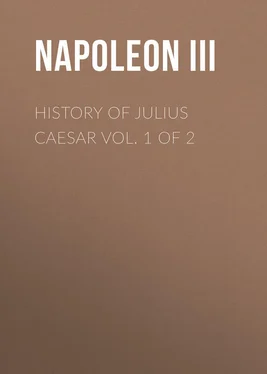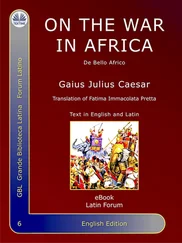Napoleon III - History of Julius Caesar Vol. 1 of 2
Здесь есть возможность читать онлайн «Napoleon III - History of Julius Caesar Vol. 1 of 2» — ознакомительный отрывок электронной книги совершенно бесплатно, а после прочтения отрывка купить полную версию. В некоторых случаях можно слушать аудио, скачать через торрент в формате fb2 и присутствует краткое содержание. Жанр: foreign_antique, foreign_prose, Биографии и Мемуары, на английском языке. Описание произведения, (предисловие) а так же отзывы посетителей доступны на портале библиотеки ЛибКат.
- Название:History of Julius Caesar Vol. 1 of 2
- Автор:
- Жанр:
- Год:неизвестен
- ISBN:нет данных
- Рейтинг книги:5 / 5. Голосов: 1
-
Избранное:Добавить в избранное
- Отзывы:
-
Ваша оценка:
- 100
- 1
- 2
- 3
- 4
- 5
History of Julius Caesar Vol. 1 of 2: краткое содержание, описание и аннотация
Предлагаем к чтению аннотацию, описание, краткое содержание или предисловие (зависит от того, что написал сам автор книги «History of Julius Caesar Vol. 1 of 2»). Если вы не нашли необходимую информацию о книге — напишите в комментариях, мы постараемся отыскать её.
History of Julius Caesar Vol. 1 of 2 — читать онлайн ознакомительный отрывок
Ниже представлен текст книги, разбитый по страницам. Система сохранения места последней прочитанной страницы, позволяет с удобством читать онлайн бесплатно книгу «History of Julius Caesar Vol. 1 of 2», без необходимости каждый раз заново искать на чём Вы остановились. Поставьте закладку, и сможете в любой момент перейти на страницу, на которой закончили чтение.
Интервал:
Закладка:
As to the comitia, the people had there only a feeble influence. In the assemblies by centuries, the vote of the first classes, composed of the richest citizens, as we have seen, prevailed over all the others; in the comitia by curiæ, the patricians were absolute masters; and when, towards the end of the third century, the plebeians obtained the comitia by tribes, 104 104 “The most remarkable event of this year (the year of Rome 282), in which military successes were so nearly balanced, and in which discord broke out in the camp and in the town with so much fury, was the establishment of the comitia by tribes , an innovation which gave to the plebeians the honour of the victory, but little real advantage. In fact, the exclusion of the patricians deprived the comitia of all their pomp, without augmenting the power of the people or diminishing that of the Senate.” (Titus Livius, II. 60.)
this concession did not add sensibly to their prerogatives. It was confined to the power of assembling in the public places where, divided according to tribes, they placed their votes in urns for the election of their tribunes and ediles, previously elected by the centuries; 105 105 Assembly of the people both of the town and country; the suffrages were given in it, not by centuries, but by tribes: – “The day of the third market, from an early hour in the morning, the public place was occupied by so great a crowd of country people as had never been seen before. The tribunes assembled the people by tribes, and, dividing the Forum by ropes stretched across, formed as many distinct spaces as there were tribes. Then, for the first time, the Roman people gave its suffrages by tribes, in spite of the opposition of the patricians, who tried to prevent it, and demanded that they should assemble by centuries, according to the ancient custom.” (Year of Rome 263.) (Dionysius of Halicarnassus, VII. 59.) – “From that period (the year 283, consulate of Appius) to our days, the comitia by tribes have elected the tribunes and ediles, without auspices or observation of other auguries. Thus ended the troubles which agitated Rome.” (Dionysius of Halicarnassus, IX. 49.) – “The Roman people, more irritated than ever, demanded that for each tribe a third urn should be added for the town of Rome, in order to put the suffrages in it.” (Year of Rome 308.) (Dionysius of Halicarnassus, XI. 52.)
their decisions concerned themselves only, and entailed no obligations on the patricians; so that the same town then offered the spectacle of two cities each having its own magistrates and laws. 106 106 “Duas civitates ex una factas: suos cuique parti magistratus, suas leges esse.” (Titus Livius, II. 44.) – “In fact, we are, as you see yourselves, divided into two towns, one of which is governed by poverty and necessity, and the other by abundance of all things and by pride and insolence.” (Year of Rome 260). ( Speech of Titus Larcius to the envoys of the Volsci , Dionysius of Halicarnassus, VI. 36,)
At first the patricians would not form part of the assembly by tribes, but they soon saw the advantage of it, and, towards 305, entered it with their clients. 107 107 The clients began to vote in the comitia by tribes after the law Valeria Horatia; we see, by the account of Titus Livius (V. 30, 32), that in the time of Camillus the clients and the patricians had already entered the comitia by tribes.
Transformation of the Aristocracy.
III. This political organisation, the reflex of a society composed of so many different elements, could hardly have constituted a durable order of things, if the ascendency of a privileged class had not controlled the causes of dissensions. This ascendency itself would soon have diminished if concessions, forced or voluntary, had not gradually lowered the barriers between the two orders.
In fact, the arbitrary conduct of the consuls, who were, perhaps, originally nominated by the Senate alone, 108 108 Appian, Civil Wars , I. 1.
excited sharp recriminations: “the consular authority,” cried the plebeians, “was, in reality, almost as heavy as that of the kings. Instead of one master they had two, invested with absolute and unlimited power, without rule or bridle, who turned against the people all the threats of the laws, and all their punishments.” 109 109 Titus Livius, III. 9.
Although after the year 283 the patricians and plebeians were subjected to the same judges, 110 110 Lectorius, the most aged of the tribunes of the people, spoke of laws which had not been long made. “By the first, which concerned the translation of judgments, the Senate granted to the people the power of judging any one of the patricians.” (Year of Rome 283.) (Dionysius of Halicarnassus, IX. 46.)
the want of fixed laws left the goods and lives of the citizens delivered to the will either of the consuls or of the tribunes. It became, therefore, indispensable to establish the legislation on a solid basis, and in 303 ten magistrates called decemvirs were chosen, invested with the double power, consular and tribunitian, which gave them the right of convoking equally the assemblies by centuries and by tribes. They were charged with the compilation of a code of laws afterwards known as the Laws of the Twelve Tables , which, engraved on brass, became the foundation of the Roman public law. Yet they persisted in making illegal the union contracted between persons of the two orders, and left the debtor at the mercy of the creditor, contrary to the decision of Servius Tullius.
The decemvirs abused their power, and, on their fall, the claims of the plebeians increased; the tribuneship, abolished during three years, was re-established; it was decided that an appeal to the people from the decision of any magistrate should be permitted, and that the laws made in the assemblies by tribes, as well as in the assemblies by centuries, should be obligatory on all. 111 111 “The laws voted by the people in the comitia by tribes were to be obligatory on all Romans, and have the same force as those which were made in the comitia by centuries. The pain of death and confiscation was even pronounced against any one who should be convicted of having in anything abrogated or violated this regulation. This new ordinance cut short the old quarrels between the plebeians and the patricians, who refused to obey the laws made by the people, under the pretext that what was decided in the assemblies by tribes was not obligatory on all the town, but only on the plebeians; and that, on the contrary, what was decided in the comitia by centuries became law as well for themselves as for the other citizens.” (Year of Rome 305.) (Dionysius of Halicarnassus, XI. 45.) – “One point always contested between the two orders was to know if the patricians were subjected to the plebiscita . The first care of the consuls was to propose to the comitia assembled by centuries a law to the effect that the decrees of the people assembled by tribes should be laws of the State.” (Year of Rome 305.) (Titus Livius, III. 55.) – “The patricians pretended that they alone had the power of giving laws.” (Titus Livius, III. 31.)
There were thus, then, three sorts of comitia; the comitia by curiæ, which, conferring the imperium on the magistrates elected by the centuries, sanctioned in some sort the election of the consuls; 112 112 “The comitia by curiæ for everything which concerns military affairs; the comitia by centuries for the election of your consuls and of your military tribunes, &c.” (Titus Livius, V. 52.)
the comitia by centuries, over which the consuls presided; and the comitia by tribes, over which the tribunes presided; the first named the consuls, the second the plebeian magistrates, and both, composed of nearly the same citizens, had equally the power of approving or rejecting the laws; but in the former, the richest men and the nobility had all the influence, because they formed the majority of the centuries and voted first; while in the latter, on the contrary, the voters were confounded with that of the tribe to which they belonged. “If,” says an ancient author, “the suffrages are taken by gentes ( ex generibus hominum ), the comitia are by curiæ ; if according to age and census, they are by centuries ; finally, if the vote be given according to territorial circumscription ( regionibus ), they are by tribes .” 113 113 Aulus Gellius, XV. 27. – Festus, under the words Scitum populi .
In spite of these concessions, antagonism in matters of law reigned always between the powers, the assemblies, and the different classes of society.
Интервал:
Закладка:
Похожие книги на «History of Julius Caesar Vol. 1 of 2»
Представляем Вашему вниманию похожие книги на «History of Julius Caesar Vol. 1 of 2» списком для выбора. Мы отобрали схожую по названию и смыслу литературу в надежде предоставить читателям больше вариантов отыскать новые, интересные, ещё непрочитанные произведения.
Обсуждение, отзывы о книге «History of Julius Caesar Vol. 1 of 2» и просто собственные мнения читателей. Оставьте ваши комментарии, напишите, что Вы думаете о произведении, его смысле или главных героях. Укажите что конкретно понравилось, а что нет, и почему Вы так считаете.












